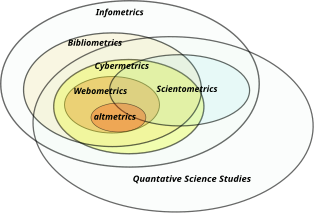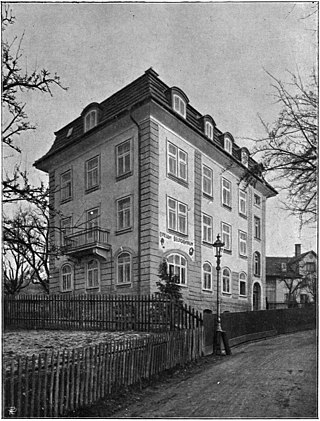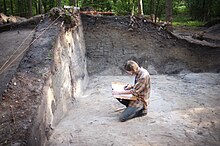
The Union of International Associations (UIA) is a non-profit non-governmental research institute and documentation center based in Brussels, Belgium, and operating under United Nations mandate. It was founded in 1907 under the name Central Office of International Associations by Henri La Fontaine, the 1913 Nobel Peace Prize laureate, and Paul Otlet, a founding father of what is now called information science.

Information science is an academic field which is primarily concerned with analysis, collection, classification, manipulation, storage, retrieval, movement, dissemination, and protection of information. Practitioners within and outside the field study the application and the usage of knowledge in organizations in addition to the interaction between people, organizations, and any existing information systems with the aim of creating, replacing, improving, or understanding the information systems.

A document is a written, drawn, presented, or memorialized representation of thought, often the manifestation of non-fictional, as well as fictional, content. The word originates from the Latin Documentum, which denotes a "teaching" or "lesson": the verb doceō denotes "to teach". In the past, the word was usually used to denote written proof useful as evidence of a truth or fact. In the Computer Age, "document" usually denotes a primarily textual computer file, including its structure and format, e.g. fonts, colors, and images. Contemporarily, "document" is not defined by its transmission medium, e.g., paper, given the existence of electronic documents. "Documentation" is distinct because it has more denotations than "document". Documents are also distinguished from "realia", which are three-dimensional objects that would otherwise satisfy the definition of "document" because they memorialize or represent thought; documents are considered more as two-dimensional representations. While documents can have large varieties of customization, all documents can be shared freely and have the right to do so, creativity can be represented by documents, also. History, events, examples, opinions, etc. all can be expressed in documents.

Bibliography, as a discipline, is traditionally the academic study of books as physical, cultural objects; in this sense, it is also known as bibliology. English author and bibliographer John Carter describes bibliography as a word having two senses: one, a list of books for further study or of works consulted by an author ; the other one, applicable for collectors, is "the study of books as physical objects" and "the systematic description of books as objects".

Paul Marie Ghislain Otlet was a Belgian author, entrepreneur, lawyer and peace activist; predicting the arrival of the internet before World War II, he is among those considered to be the father of information science, a field he called "documentation". Otlet created the Universal Decimal Classification, which would later become a faceted classification. Otlet was responsible for the development of an early information retrieval tool, the "Repertoire Bibliographique Universel" (RBU) which utilized 3x5 inch index cards, used commonly in library catalogs around the world. Otlet wrote numerous essays on how to collect and organize the world's knowledge, culminating in two books, the Traité de Documentation (1934) and Monde: Essai d'universalisme (1935).
The Association for Information Science and Technology (ASIS&T) is a nonprofit membership organization for information professionals that sponsors an annual conference as well as several serial publications, including the Journal of the Association for Information Science and Technology (JASIST). The organization provides administration and communications support for its various divisions, known as special-interest groups or SIGs; provides administration for geographically defined chapters; connects job seekers with potential employers; and provides organizational support for continuing education programs for information professionals.
Michael Keeble Buckland is an emeritus professor at the UC Berkeley School of Information and co-director of the Electronic Cultural Atlas Initiative.

The Mundaneum was an institution which aimed to gather together all the world's knowledge and classify it according to a system called the Universal Decimal Classification. It was developed at the turn of the 20th century by Belgian lawyers Paul Otlet and Henri La Fontaine. The Mundaneum has been identified as a milestone in the history of data collection and management, and as a precursor to the Internet.
A documentalist is a professional, trained in documentation science and specializing in assisting researchers in their search for scientific and technical documentation. With the development of bibliographical databases such as MEDLINE, documentalists were professionals who searched such databases on the behalf of users.
DOCAM was an international alliance of researchers from various institutions and disciplines dedicated to the documentation and conservation of media arts. The project was the result of a five-year mandate lasting from 2005 until 2010. Outcomes of the project include a cataloguing guide incorporating case studies, a conservation guide explaining preservation issues specific to time-based media, a technological timeline, a documentation model for digital curation and preservation of time-based media, and a glossary and thesaurus for media arts.
The International Federation for Information and Documentation (FID) was an international organization that was created to promote universal access to all recorded knowledge through the creation of an international classification system. FID stands for the original French Fédération internationale de documentation.
The term information scientist developed in the latter part of the twentieth century by Wm. Hovey Smith to describe an individual, usually with a relevant subject degree or high level of subject knowledge, providing focused information to scientific and technical research staff in industry. It is a role quite distinct from and complementary to that of a librarian. Developments in end-user searching, together with some convergence between the roles of librarian and information scientist, have led to a diminution in its use in this context, and the term information officer or information professional are also now used.
The following outline is provided as an overview of and topical guide to information science:
Renée-Marie-Hélène-Suzanne Briet, known as "Madame Documentation," was a librarian, author, historian, poet, and visionary best known for her treatise Qu'est-ce que la documentation?, a foundational text in the modern study of information science. She is also known for her writings on the history of Ardennes and the poet Arthur Rimbaud.
Herman Howe Fussler was an American librarian, library administrator, teacher, writer and editor, who was a pioneer in the use of microphotography. Fussler was ranked as one of the "100 of the Most Important Leaders we had in the 20th Century" by American Libraries. Fussler served as director of the University of Chicago libraries from 1948 to 1971, was Dean of the University of Chicago Graduate Library School, from 1961 to 1963, and was instrumental in the founding of the Regenstein Library. He helped create the Center for Research Libraries. He was an elected fellow of the American Academy of Arts and Sciences and the American Association for the Advancement of Science.
The World Congress of Universal Documentation was held from 16 to 21 August 1937 in Paris, France. Delegates from 45 countries met to discuss means by which all of the world's information, in print, in manuscript, and in other forms, could be efficiently organized and made accessible.

Information history may refer to the history of each of the categories listed below. It should be recognized that the understanding of, for example, libraries as information systems only goes back to about 1950. The application of the term information for earlier systems or societies is a retronym.
W. Boyd Rayward is an Australian librarian and scholar, best known as the biographer of Paul Otlet.
Herbert Haviland Field was an American zoologist who founded the Concilium Bibliographicum, a leading science information service in the early twentieth century and was the father of Noel Field and Hermann Field.

The Concilium Bibliographicum was established in Zurich, Switzerland, in 1895 by the U.S. zoologist Herbert Haviland Field in response to the lack of timely and complete bibliographies to serve the new sciences that had begun to emerge in the late nineteenth century. Initially using his own funds, Field assumed the task of surveying all science journals and to use the then new index-cards and the highly sophisticated but complex Universal Decimal Classification system to send packets, bi-weekly, to his subscribers who were each to build a cumulative card file that would allow access to complete bibliographic citations and subject identifiers for all the literature on zoology and related fields from 1895 to the present.








